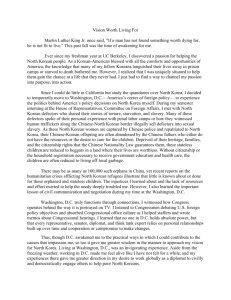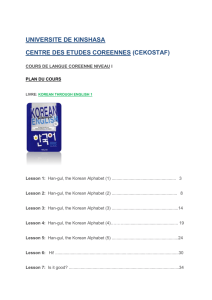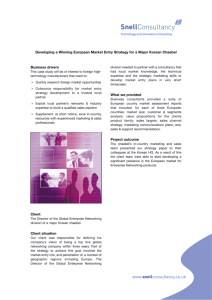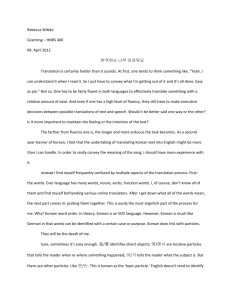EDD 724 - Ewha Global Online Campus
advertisement
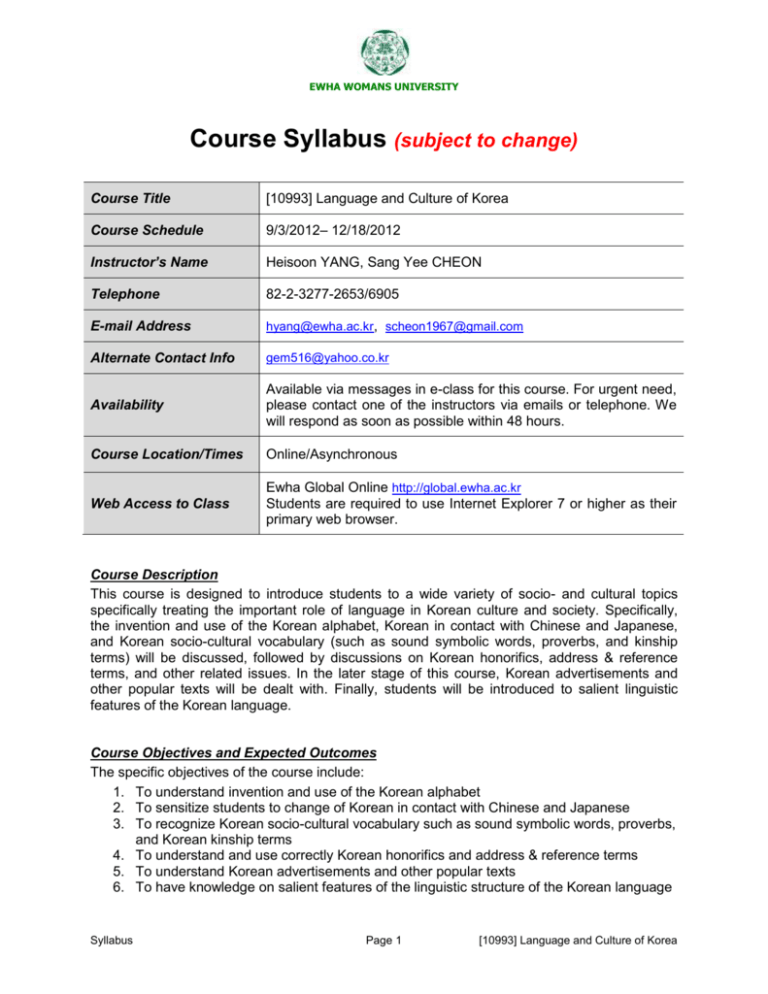
EWHA WOMANS UNIVERSITY Course Syllabus (subject to change) Course Title [10993] Language and Culture of Korea Course Schedule 9/3/2012– 12/18/2012 Instructor’s Name Heisoon YANG, Sang Yee CHEON Telephone 82-2-3277-2653/6905 E-mail Address hyang@ewha.ac.kr, scheon1967@gmail.com Alternate Contact Info gem516@yahoo.co.kr Availability Available via messages in e-class for this course. For urgent need, please contact one of the instructors via emails or telephone. We will respond as soon as possible within 48 hours. Course Location/Times Online/Asynchronous Web Access to Class Ewha Global Online http://global.ewha.ac.kr Students are required to use Internet Explorer 7 or higher as their primary web browser. Course Description This course is designed to introduce students to a wide variety of socio- and cultural topics specifically treating the important role of language in Korean culture and society. Specifically, the invention and use of the Korean alphabet, Korean in contact with Chinese and Japanese, and Korean socio-cultural vocabulary (such as sound symbolic words, proverbs, and kinship terms) will be discussed, followed by discussions on Korean honorifics, address & reference terms, and other related issues. In the later stage of this course, Korean advertisements and other popular texts will be dealt with. Finally, students will be introduced to salient linguistic features of the Korean language. Course Objectives and Expected Outcomes The specific objectives of the course include: 1. To understand invention and use of the Korean alphabet 2. To sensitize students to change of Korean in contact with Chinese and Japanese 3. To recognize Korean socio-cultural vocabulary such as sound symbolic words, proverbs, and Korean kinship terms 4. To understand and use correctly Korean honorifics and address & reference terms 5. To understand Korean advertisements and other popular texts 6. To have knowledge on salient features of the linguistic structure of the Korean language Syllabus Page 1 [10993] Language and Culture of Korea EWHA WOMANS UNIVERSITY At the end of course, students are expected to attain a comprehensive and thorough understanding of various important socio- and ethno-linguistic aspects in which the Korean language interacts with tradition, cultural perspectives and social contexts of Korea. Textbook and Required Readings 1. Sohn, Ho-min (ed.) 2006. Korean Language in Culture and Society. Honolulu: University of Hawaii Press. Students are responsible for purchasing or renting the textbook. It can be purchased on-line through the following websites: www.kyobobook.co.kr/product/detailViewEng.laf?ejkGb=ENG&mallGb=ENG&barcode=97808 24826949&orderClick=LAI www.yes24.com/24/goods/1636397 www.amazon.com/Korean-Language-Culture-Society-Textbooks/dp/0824826949 2. Additional reading materials will be provided on-line by instructors. Course Requirements and Expectations A beginning level of proficiency in Korean is required in order to understand the Korean examples with facility. 1. Online Attendance (10%) and Participation (10%) Attendance (10%) and Participation (10%) on line will be taken very seriously in this course. All students are expected to visit the course website every week, and participate actively in all of the class activities. Throughout the semester, students are encouraged to ask questions and make comments or feedbacks regarding lectures, materials, and questions & issues raised by instructors and other students. The online system automatically keeps track of your attendance and participation. 2. 10 Quizzes (20%, 2% each) Students are required not only to read the assigned reading materials but also to study them thoroughly in order to be ready for quizzes. A quiz will be short, mostly consisting of true/false, multiple choice, and short answer questions, regarding basic terms from the assigned readings which students are asked to define and exemplify with actual language data (either from the reading or of their own invention). For each chapter (except Chapters 7 and 20), a quiz will be posted up by Tuesday, 11 AM Korea Standard Time (KST), and each student is asked to complete the quiz and submit it by Saturday, 11 PM KST of the same week. 3. Midterm examination (20%) Midterm exam will be conducted in a given time period. It will include essay questions, true/false, and short answers, covering everything (including quizzes) students will have studied up to that point. Syllabus Page 2 [10993] Language and Culture of Korea EWHA WOMANS UNIVERSITY 4. Writing assignments (20%) and final term paper (20%) Two writing assignments (20%, 10% each) and one final term paper (20%) will be an important means of evaluating students’ performance in the course, making up 40% of a students’ grade. From the outset, students will be encouraged to see the crucial importance of their individual writings, since their writings will be integrated into basic parts of class material, structure, and management. Each of the submitted short writings will be given a feedback from instructors, and students are encouraged to submit a revised version to boost their grades. The revision process may involve individual online conference with instructors. Students must adequately complete all the writing assignments to pass the course with a D grade or better. Topics and detailed guidelines for two writing assignments will be posted in advance during the semester, whereas the topic of final term paper must be selected by students and can be consulted with instructors in advance. Each of the two short writings must be a minimum of 2 pages, and the final term paper must be 6-8 pages, double-spaced, Times New Roman, 12. For citation and referencing, it is recommended that students follow APA or MLA style. If you are not familiar with any of these two styles, please consult online writing guidelines at www.apastyle.org (APA) or www.mla.org/style (MLA). Academic Honesty: No Plagiarism It is ultimately each student’s responsibility to understand the rules regarding plagiarism and to learn how to avoid such violations. Common punishments for such violations include failing the assignment or failing the course. Plagiarism includes but is not limited to submitting intentionally or knowingly any work that has been copied in whole or in part from another individual's work without attributing that borrowed portion to the individual; neglecting to identify as a quotation another's idea; submitting the same written material in more than one course without obtaining authorization from the instructors involved; or obtaining and using experimental data from other sections of a course or from previous terms. Grading The final course grade will be determined based on the followings: Requirements Ratio Online Attendance and participation 20% (10% each) 10 Quizzes 20% (2% each) Midterm examination 20% 2 writing assignments 20% (10% each) Final term paper 20% Total 100% Notes Policy on missed quizzes and exam: There will be NO individual re-scheduling for quizzes, midterm exam, and submission of short writings and a final term paper, unless provided with an official proof for a justifiable reason. Syllabus Page 3 [10993] Language and Culture of Korea EWHA WOMANS UNIVERSITY Late assignments: Late assignments will be penalized with a 10% grade deduction for each day late unless you have made prior arrangements with instructors. Incompletes: A student who experiences unanticipated circumstances and fails to complete all course requirements must contact one of the instructors prior to the end date of the course. Students who speak English or Korean as a foreign language (EFL/KFL): This course requires command of English and beginning level proficiency of Korean at the same time. For this reason, the course may be rather challenging for many of EFL and KFL students due to their (possibly) low proficiency in English and/or Korean. Nevertheless, all of those students are strongly encouraged to participate actively in class based on readings and class videos. Also, please understand that only a small number of students in class would be proficient enough to understand and produce the two languages. The assessment of students’ performance will be based more highly on their motivation and quality of their performance rather than their proficiency in languages. Points and Grades Grades will be based on a curve adjusted according to the level of the students. Top Top 1-10% A+ 61-80% B 11-25% A 81-90% B- 26-40% A91-100% C+, C C-, D F 41-60% B+ Course Schedule (subject to change) Weekly schedule for the course goes from Tuesday to Monday (KST), starting on the first Tuesday (KST) of the semester and ending on Monday of the last week. The schedule is tentative and subject to change as we proceed through the semester. Week # Topics 1 (9/4~ 10) Course Overview Romanization System of Korean 2 (9/11~ 17) Language, culture, and society Evolution of the Korean language in relation to culture and society Socio-cultural dynamism in the Korean language Syllabus To Read Chap. 1 Introduction Page 4 To Do Due Dates (All KST) Introduce yourself 11 PM 9/8(Sat.) Quiz 1 on Chap. 1 [practice] 11 PM 9/15(Sat.) [practice] [10993] Language and Culture of Korea EWHA WOMANS UNIVERSITY Topics To Read To Do Due Dates (All KST) 3 (9/18~ 24) The invention of han’gŭl The design principles of the han’gŭl letters The use of han’gŭl Orthographic principles Chap. 2 The Invention and Use of the Korean Alphabet Quiz 2 on Chap. 2 11 PM 9/22(Sat) 4 (9/25~ 10/1) The origin of Sino-Korean verbs The three layers of SK words Sino-Korean pronunciation The enrichment of the Korean vocabulary The obliteration of native words Chap. 4 Korean in Contact with Chinese Quiz 3 on Chap. 4 11 PM 9/29(Sat) 5 (10/2~ 8) Ancient contacts The colonial period Coping with the aftermath Japanese in Korean today Chap. 5 Korean in Contact with Japanese Quiz 4 on Chap. 5 11 PM 10/6(Sat) 6 (10/9~ 15) Changes of initial consonants Vowel changes Changes of final consonants Chap. 6 Sound Symbolism in Korean Quiz 5 on Chap. 6 11 PM 10/13(Sat) 7 (10/16 ~22) Definition and history of proverbs The formation of Korean proverbs Ethnic characteristics of Korean proverbs Chap. 7 Korean Proverbs Writing 1 (No quiz on Chap. 7) 11 PM 10/20(Sat) Mid-term Exam 11 PM 10/27(Sat) Week # 8 (10/23 ~29 Mid-term Exam [No Lecture] 9 (10/30 ~11/5) Modern standard Korean kinship terminology Kinship terms of address in a rapidly changing society Chap. 9 Korean Kinship Terminology (up to p. 111) Quiz 6 on Chap. 9 11 PM 11/3(Sat) 10 (11/6~ 12) Addressee-related honorifics Referent-related honorifics An integrated picture of honorifics in Korean Chap. 11 The Structure and Use of Korean Honorifics Quiz 7 on Chap. 11 11 PM 11/10(Sat) 11 (11/13 ~19) Power and solidarity Korean address-reference terms Comparison between Korean and English address-reference terms Chap. 12 Usage of Korean Address and Reference Terms Quiz 8 on Chap. 12 11 PM 11/17(Sat) Syllabus Page 5 [10993] Language and Culture of Korea EWHA WOMANS UNIVERSITY Topics To Read To Do Due Dates (All KST) Chap. 15 Korean Cultural Values in Request Behaviors Quiz 9 on Chap. 15 11 PM 11/24(Sat) 12 (11/20 ~26) Communicative differences among KFL learners, Korean native speakers, and American native speakers Cross-cultural values reflected in request behaviors of the different groups of speakers 13 (11/27 ~12/3) Characteristics of advertising text in Korean Advertisements in Korean cultural context Chap. 18 Advertisements in Korean Quiz 10 on Chap 18 11 PM 12/1(Sat) 14 (12/4~ 10) Sound patterns Word structure Sentence structure Honorifics Macro-micro structure and discourse-orientedness Chap. 20 Linguistic Structures of Korean Writing 2 (No quiz on Chap. 20) 11 PM 12/8(Sat) 15 (12/11 ~17) Wrap-up of the course [No Lecture] Final Term Paper 11 PM 12/20(Th) Week # Syllabus Page 6 [10993] Language and Culture of Korea

